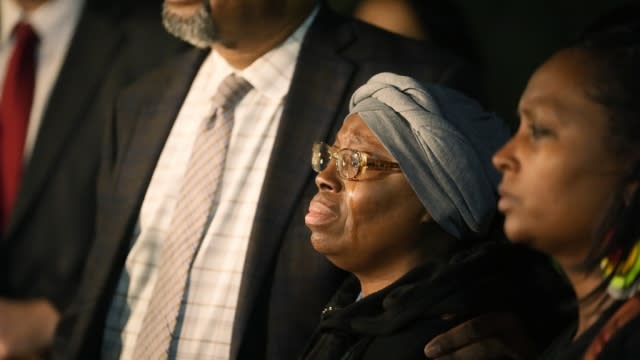Elijah McClain's mom says paramedics' guilty verdicts aren't justice

Elijah McClain's mother, Sheneen, said it was a "very small acknowledgment for accountability" from the guilty verdicts in the trial of two paramedics charged with the death of her son, a 23-year-old unarmed Black man who was subdued by police and injected with a deadly dose of ketamine by paramedics while walking home from a convenience store in 2019.
A mostly white jury found Jeremy Cooper and Peter Cichuniec guilty of criminally negligent homicide on Friday after two days of deliberations. Cichuniec was also found guilty of second-degree assault.
"No, the 3 out of 5 convictions are not justice, the only thing the convictions serve is a very small acknowledgment for accountability in the justice systems," she said in a statement posted to social media. "My son's murder case is part of a continuum of hatred that is spread throughout this world."
However, Colorado Attorney General Phil Weiser said his team is satisfied with the outcome of the nearly four-week trial.
"We knew these cases would be difficult to prosecute," said Weiser is a statement. "The world – Elijah and especially his mother Sheneen McClain — deserved to have the full story told. And justice demanded it."
Three police officers were prosecuted in two earlier trials following the national attention and outrage from McClain’s murder. One officer, Randy Roedema, was convicted of criminally negligent homicide and third-degree assault and will be sentenced in January. The other two officers were acquitted, and one has returned to work with the Aurora Police Department.
Police confronted Elijah on Aug. 24, 2019, after someone called 911, stating he “looked sketchy” and was wearing a ski mask while he was walking home carrying a plastic bag with iced tea, according to the indictment.
Although McClain was not committing any crime, officers attempted to handcuff him, wrestled him to the ground and used a carotid hold, which restricts blood to the brain to render someone unconscious. When medical responders arrived, they injected him with the powerful sedative ketamine.
The paramedics testified during their trial they were following their training for treating patients experiencing "excited delirium," a controversial term used to describe someone who is mentally dissociated or unable to control their body. It's since been rejected by many medical professionals as a legitimate medical diagnosis.
"During our training, we were told numerous times that this is a safe, effective drug," Cichuniec told the court, as reported by CNN.
Aurora Fire Rescue Chief Alec Oughton said both paramedics’ employment with the department has been terminated.
"While I appreciate the jury's diligence, integrity and public service to ensure a fair trial, I am discouraged that these paramedics have received felony punishment for following their training and protocols in place at the time and for making discretionary decisions while taking split-second action in a dynamic environment," Oughton said.
He also noted the organization has made numerous changes to its policies, protocols and training since McClain’s murder, including "required 100% quality-assurance review on all sedative administration and strict adherence to this new protocol."
The prosecution against the paramedics was a rare one that raised the question of the role that medical personnel play in police encounters and how they could be held responsible for the outcome.
"While we respect the jury’s verdict; this decision could mean EMS clinicians may approach patient encounters with fear that errors concerning medication and quality of care will be viewed as criminal offenses," said José Cabañas, president of the National Association of EMS Physicians.
"Tragic incidents like this should be thoroughly examined through a non-criminal process that assures the systematic examination of contributing factors so similar events can be avoided, and ultimately lead to safer out-of-hospital emergency medical care," he said.
SEE MORE: In Real Life: Injected
